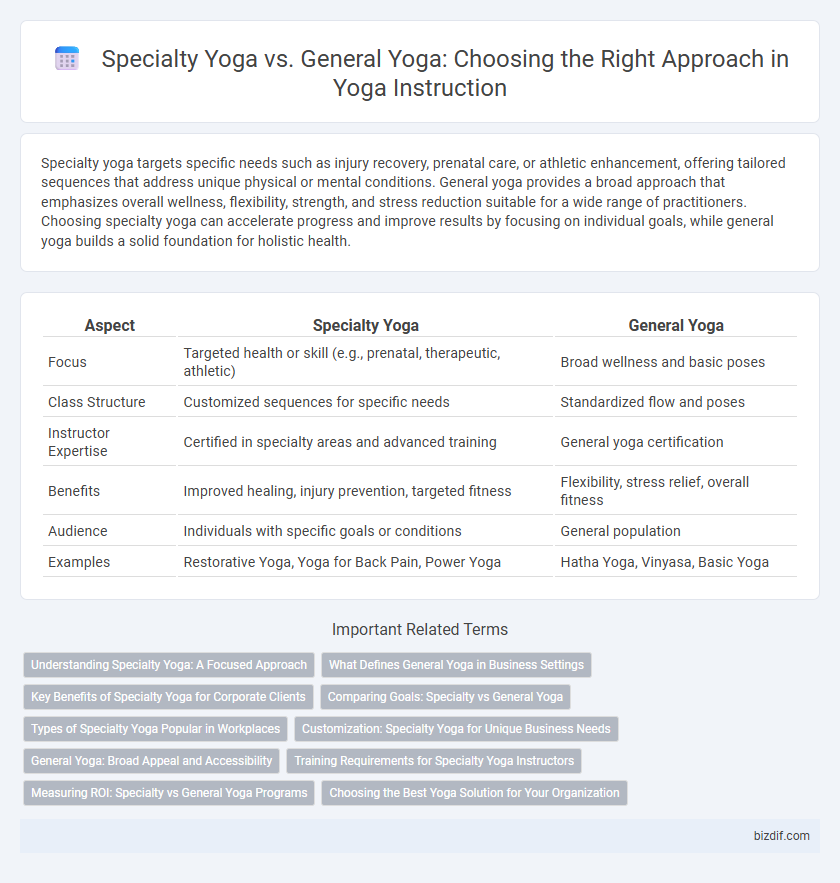Specialty yoga targets specific needs such as injury recovery, prenatal care, or athletic enhancement, offering tailored sequences that address unique physical or mental conditions. General yoga provides a broad approach that emphasizes overall wellness, flexibility, strength, and stress reduction suitable for a wide range of practitioners. Choosing specialty yoga can accelerate progress and improve results by focusing on individual goals, while general yoga builds a solid foundation for holistic health.
Table of Comparison
| Aspect | Specialty Yoga | General Yoga |
|---|---|---|
| Focus | Targeted health or skill (e.g., prenatal, therapeutic, athletic) | Broad wellness and basic poses |
| Class Structure | Customized sequences for specific needs | Standardized flow and poses |
| Instructor Expertise | Certified in specialty areas and advanced training | General yoga certification |
| Benefits | Improved healing, injury prevention, targeted fitness | Flexibility, stress relief, overall fitness |
| Audience | Individuals with specific goals or conditions | General population |
| Examples | Restorative Yoga, Yoga for Back Pain, Power Yoga | Hatha Yoga, Vinyasa, Basic Yoga |
Understanding Specialty Yoga: A Focused Approach
Specialty yoga targets specific populations or goals, such as prenatal, therapeutic, or athletic yoga, delivering tailored practices that address unique physical, mental, or emotional needs. This focused approach enhances effectiveness by incorporating specialized techniques, modifications, and sequencing aligned with particular health conditions or performance objectives. Understanding specialty yoga enables instructors to design precise, context-driven sessions that promote deeper healing, injury prevention, and optimal well-being beyond general yoga's broad framework.
What Defines General Yoga in Business Settings
General Yoga in business settings emphasizes accessible, adaptable practices designed to accommodate diverse employee needs and promote overall wellness. It integrates fundamental postures, breathing techniques, and relaxation exercises suitable for various fitness levels without specialized therapeutic or targeted goals. This approach supports stress reduction, improved focus, and increased productivity within corporate wellness programs.
Key Benefits of Specialty Yoga for Corporate Clients
Specialty yoga for corporate clients offers targeted benefits such as stress reduction, enhanced focus, and improved posture specific to office environments. Tailored sessions address workplace-related physical and mental health challenges, leading to increased employee productivity and reduced absenteeism. These customized programs foster a healthier corporate culture by promoting mindfulness and resilience among staff.
Comparing Goals: Specialty vs General Yoga
Specialty Yoga targets specific outcomes such as injury rehabilitation, prenatal wellness, or athletic performance enhancement, catering to individual needs through tailored sequences and techniques. General Yoga focuses on holistic benefits including stress reduction, improved flexibility, and overall physical and mental well-being for a broad audience. The goals of Specialty Yoga are precise and condition-specific, while General Yoga aims for balanced health and mindfulness across diverse practitioners.
Types of Specialty Yoga Popular in Workplaces
Specialty yoga in workplaces includes types such as chair yoga, which adapts traditional poses for seated office environments, and restorative yoga, emphasizing relaxation and stress relief to boost employee well-being. Another popular form is mindfulness yoga, integrating meditation and breathwork to enhance focus and reduce anxiety during work hours. These specialized yoga styles cater to varying physical abilities and mental health needs, making them effective for corporate wellness programs.
Customization: Specialty Yoga for Unique Business Needs
Specialty yoga offers tailored practices designed to meet the specific needs of diverse clients, such as prenatal, therapeutic, or corporate yoga programs, enhancing effectiveness and engagement. Customized sequences in specialty yoga address individual health conditions, fitness goals, or professional environments, leading to improved physical and mental well-being. Unlike general yoga, specialty yoga prioritizes personalized adjustments and targeted outcomes that align directly with unique business objectives and client demographics.
General Yoga: Broad Appeal and Accessibility
General Yoga offers a broad appeal with accessible practices suitable for all age groups and fitness levels, emphasizing foundational poses and breathing techniques. This inclusive approach promotes mental clarity, physical flexibility, and overall wellness without requiring prior experience or specialized skills. Its flexibility in class structure and absence of advanced techniques make it ideal for beginners and those seeking a balanced, gentle introduction to yoga.
Training Requirements for Specialty Yoga Instructors
Specialty yoga instructors must complete advanced training programs that focus on specific disciplines such as prenatal, therapeutic, or power yoga, often requiring 300+ hours of specialized coursework. These certifications emphasize anatomy, injury prevention, and tailored sequencing to address unique student needs beyond general yoga teacher training. Mastery in specialty yoga equips instructors with skills to safely guide diverse populations and accommodate physical limitations effectively.
Measuring ROI: Specialty vs General Yoga Programs
Specialty yoga programs, such as prenatal or therapeutic yoga, often demonstrate higher ROI by attracting niche markets willing to pay premium rates for tailored experiences. General yoga classes typically see broader participation but generate lower per-class revenue and customer retention. Measuring ROI involves analyzing metrics like client acquisition costs, retention rates, session frequency, and revenue per participant, with specialty yoga often outperforming general programs in targeted profitability.
Choosing the Best Yoga Solution for Your Organization
Specialty yoga programs, such as prenatal, restorative, or therapeutic yoga, target specific populations and health goals, offering tailored benefits that general yoga classes may not provide. Choosing the best yoga solution for your organization requires assessing participant needs, wellness objectives, and available resources to align with the most effective yoga style. Integrating specialty yoga can enhance engagement and outcomes by addressing unique physical conditions, while general yoga supports broad flexibility and stress reduction for diverse groups.
Specialty Yoga vs General Yoga Infographic

 bizdif.com
bizdif.com